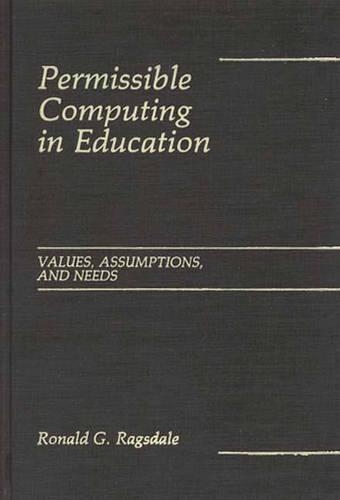
Permissible Computing in Education: Values, Assumptions, and Needs
(Hardback)
Publishing Details
Permissible Computing in Education: Values, Assumptions, and Needs
By (Author) Ronald Ragsdale
Bloomsbury Publishing PLC
Praeger Publishers Inc
20th May 1988
United States
Classifications
Tertiary Education
Non Fiction
370.285
Physical Properties
Hardback
296
Width 156mm, Height 235mm
680g
Description
Permissible Computing in Education defines and investigates the relationship between computer applications and current values and assumptions regarding computers. In addition, the author analyzes the consequences of this relationship in order to make recommendations for future computer applications to educational settings. Ragsdale first analyzes the psychology behind computer implementation in education. He examines present assumptions in educational computing and describes the evaluation of educational and computer needs. Various types of equity, including racial and sexual, possible through computer uses are addressed. Other chapters examine courseware development; artificial intelligence; appropriate programming and writing; student, teacher, and parent participation; and teacher training and research.
Reviews
The book aims to make explicit some of the value bases that support the various uses of computers in education. Permissible computing' considers underlying assumptions about values, education and technology, specifically computers. Subsequent chapters examine critical questions about the uses of computers in education, seeing them as value-laden technology. Assumptions concerning the possible effects of educational applications are also examined. The topics covered are: needs assessment and evaluation; equity; artificial intelligence; courseware development and evaluation; programming and writing; the student role; the teacher role; the parent role; and teacher development and research.-Educational Technology Abstracts
"The book aims to make explicit some of the value bases that support the various uses of computers in education. Permissible computing' considers underlying assumptions about values, education and technology, specifically computers. Subsequent chapters examine critical questions about the uses of computers in education, seeing them as value-laden technology. Assumptions concerning the possible effects of educational applications are also examined. The topics covered are: needs assessment and evaluation; equity; artificial intelligence; courseware development and evaluation; programming and writing; the student role; the teacher role; the parent role; and teacher development and research."-Educational Technology Abstracts
Author Bio
RONALD G. RAGSDALE is Professor of Educational Technology, Northwestern State University.
